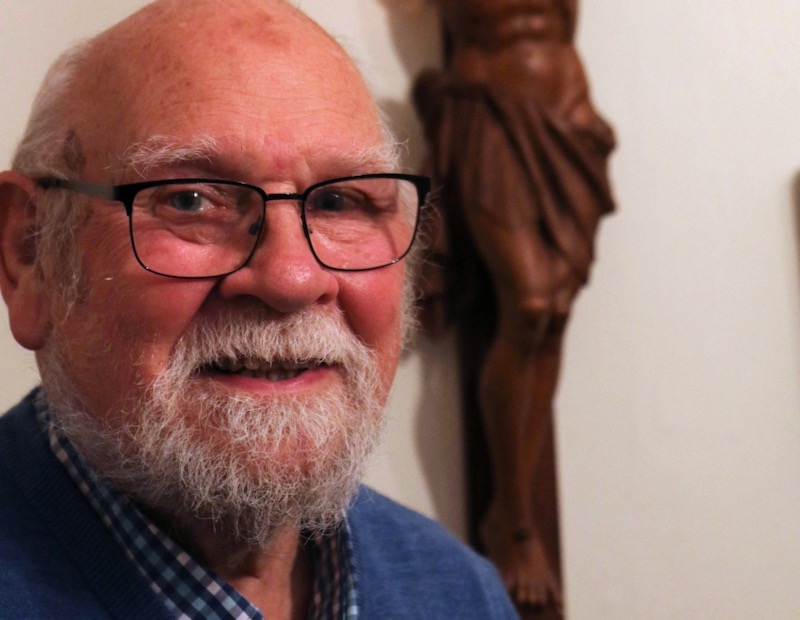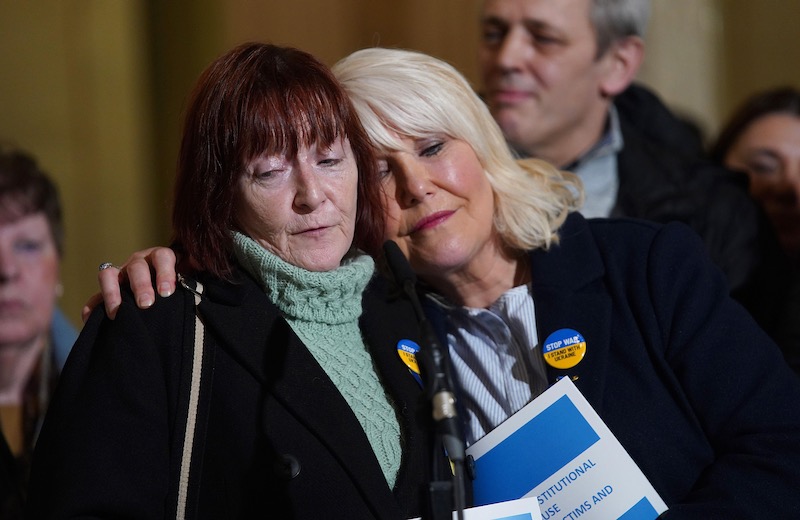Victims of institutional abuse in Northern Ireland received a formal apology at the Stormont Executive on Friday as five ministers, representing each of the main Stormont parties, offered an apology on behalf of the State for the treatment which they were subjected as children.
Representatives of six institutions that ran facilities where the abuse took place, also delivered their apologies in the Stormont chamber on behalf of the De La Salle Brothers, the Sisters of Nazareth, the Sisters of St Louis and the Good Shepherd Sisters, as well as Barnardo's and the Irish Church Missions.
Some survivors gathered at Stormont to hear the ministers and religious orders acknowledge their failings and admit they suffered physical, emotional and sexual abuse.
The apology was a key recommendation made by the Historical Institutional Abuse (HIA) Inquiry, chaired by Sir Anthony Hart, which made its recommendations in 2017.
The inquiry is the biggest child abuse inquiry in UK history and it spent seven years looking at allegations and taking public testimony. It was contacted by 400 people.
It found shocking levels of sexual, physical and emotional abuse over the period 1922 to 1995.
HIA chair, Sir Anthony Hart, recommended that those abused in state, church and charity run homes should be offered compensation as well as an official apology from government and the organisations which ran the residential facilities and a memorial.
Most of the complaints were about institutions run by the Sisters of Nazareth and the De La Salle Brothers.
The state apology was meant to have been delivered by Stormont’s First and Deputy First Minister. But as the DUP withdrew from the position of First Minister in protest at the Northern Ireland Protocol, five ministers, representing each of the main Stormont parties, had to make the apologies instead.
Fiona Ryan, commissioner for survivors of institutional childhood abuse, in her address on Friday said they were gathered “to hear words that have been delayed for years, are lifetimes late and in many cases, tragically, are too late”.
She said the HIA inquiry happened, “due to the victims and survivors themselves who fought to be seen and heard by an officialdom that was largely blind and deaf to the abuse they had suffered, to their anger and to their ongoing pain”.
“Made to feel ashamed as children. Shunned as adults. Silence was expected. Survivors, however, were not silent. Instead, they began speaking out, telling the truth of what had happened to them in these institutions,” she criticised.
Referring to the “bleak lovelessness” of the institutions Ms Ryan said: “We are talking about the systemic physical abuse, sexual abuse, emotional abuse and neglect of children for decades in residential institutions in Northern Ireland.”
The commissioner said a survivor of abuse described the process of getting redress and an apology as “tortuous”.
We must remember all of the survivors of institutional abuse, including those sent to other countries and those for whom words will never be enough, Fiona Ryan said and added that “we need to acknowledge people who have died who will not hear this apology”.
Ms Ryan called for a minute's silence before the five ministers and representatives of the religious orders delivered their remarks.
Education Minister, Michelle McIlveen of the Democratic Unionist Party (DUP), told the survivors that they were let down by the state.
“We did not ensure these homes were all free from hunger and cold, from mistreatment and abuse. It was the state’s responsibility to do that, and it failed you.”
“We neglected you, rejected you, we made you feel unwanted. It was not your fault. The state let you down.”
Ms McIlveen said survivors told ministers that they needed to hear that they were believed when they told their story. “You were not believed. We are sorry that you were not believed,” she acknowledged.
“The state has listened to you and the state believes you. Today we say that we are sorry,” she concluded.
NI Justice Minister, Naomi Long of the Alliance Party, said that when children are taken into care, they should be safe.
She acknowledged that no-one could undo what happened in the past.
“However, we – as law makers and policy makers – can commit to doing everything we can within our power to make the right laws, the right policies and the right guidance; and to provide the right support services for those who need it.”
“We acknowledge your desire to make sure that future generations of children will never have to suffer the abuse you experienced – we echo that desire, and it is our job to make sure that does not happen.”
The justice minister told survivors, “Some 13 years after you first came to Parliament Buildings, the courage and determination of all of you means that you are sitting here today listening closely to what is being said.”
“We pay tribute to your courage and determination, and to your staying power.”
Infrastructure Minister Nichola Mallon of the SDLP told the assembly that the abuse inquiry "shone a light on a dark, harsh and bleak period of our past".
No apology, she stressed, could “make up for our failings, and the pain that you as victims and survivors have endured as a result”.
“But we hope that our clear and outright acknowledgement will bring some relief."
She assured survivors, “None of this was of your doing, and none of this was your fault.”
Health Minister Robin Swann of the Ulster Unionist Party said it was critical that “every possible step is taken to ensure that nothing like this happens to any other child in the care of the state – ever again.”
Finance Minister Conor Murphy of Sinn Féin said it had taken too long for victims to receive an apology.
“You, and all victims and survivors, deserve nothing less than full acknowledgement of the harm inflicted on you as children, and the suffering you have endured throughout your lives as a result of our failures,” he said.
“You deserve to be supported in the right way, as recommended by Sir Anthony Hart.”
Referring now to one of the key recommendations – compensation - the minister said victims deserve a redress process sensitive to their needs.
“We listened to your experiences of the redress process,” he said.
“We hope that changes coming from the independent review will make the redress journey a much more victim-centred process.”
Representatives of the religious congregations who ran the institutions then addressed the assembly and offered their apologies for their failings towards the children in their care.
Brother Francis Manning of the De La Salle order said that on behalf of the religious orders they accepted responsibility that the “standard of care did not always respond appropriately to the many needs of vulnerable children”.
“We acknowledge failures in care and education services provided by us,” he said and added “We accept there were children in our care subjected to physical and sexual abuse.”
He said fear, shame and punishment were experienced and victims had carried this trauma throughout their lives. He also acknowledged that the expectations were so low that children left their institution unable to read or write.
“We accept we did not take sufficient investigations into allegations of abuse and ensure prosecutions were appropriate. These serious failures are a matter of profound regret to the De La Salle brothers.”
Sr Cornelia Walsh of the Sisters of Nazareth said there are no acceptable excuses for what happened to abuse victims.
She said the order accepted that there was systemic physical abuse, and that bullying was prevalent and that there was a regime of excessive chores that amounted to a form of abuse.
“We accept that when you sought our help to prevent physical or sexual abuse, we did not believe you.”
“We offer this sincere apology to you if you were in the care of Nazareth Houses in Belfast and Derry and for those were sent to Australasia as young children, for those whose experiences under our care between 1922 to 1995 had a detrimental impact on you. We recognise your pain and the long-awaited journey you have travelled to reach this day.”
Sr Uainin Clarke, regional leader for Ireland from the Sisters of St Louis, which ran St Joseph's Training School in Middletown, Co Armagh, said the order accepted the findings of the HIA Inquiry that during the 1950s and 1960s a harsh regime existed in St Joseph's.
“To those of you who suffered at any time while in St Joseph's and are still carrying that pain, we say: We are especially sorry that when you were a child or a teenager you did not always feel safe or believed by those in St Joseph's.”
“Instead of meeting love and encouragement you sometimes met the opposite - harshness and a lack of love and understanding.”
“Any child or teenager who was ever in St Joseph's Middletown was vulnerable and so it was truly shameful that you did not know for who or to whom you could turn to support.”
“Memories lie like scars on the heart,” she said.
Sr Cait O’Leary of the Good Shepherd Sisters acknowledged that mistakes were made in the care her congregation provided to girls and young women.
She said the process of changing names should not have happened and that the humiliation of those in their care for misdemeanours amounted to emotional abuse.
“For children admitted in an emergency situation we acknowledge that you did not receive appropriate long-term child-centred care and it was not acceptable that you were expected to engage in industrial work,” she said and added, “For this practice we are truly sorry.”
Michele Janes of Barnardo’s and Rev Mark Jones of the Irish Church Missions, a Church of Ireland organisation which ran Manor House home in Lisburn from 1929 until its closure in 1984, also offered apologies for the abuse and systemic failures identified at their homes by the HIA inquiry.
Compensation to victims was one of the main recommendations of the HIA report. So far £32m has been set aside for more than 2,000 victims with payments of around £80,000 each.
The issue voluntary organisation, who ran a number of the homes, contributing to the redress fund has still to be resolved.



 Loading ...
Loading ...